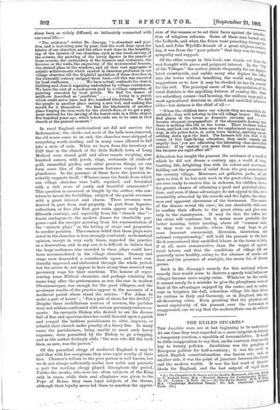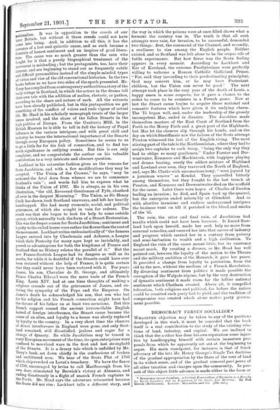THE EXILED STUARTS.*
THE Jacobite wars are at last beginning to be understood. At one time they were regarded as a mere misprint in history, a temporary reaction, a squabble of irreconcilables. It would be little exaggeration to say that, on the contrary, they are the key to twenty policies. Jacobitism was the ganglion of European politics for half-a-century ; it was the anvil on which English constitutionalism was beaten out; and, on another side, it was the point of juncture between the feudal and the modern worlds. It was the last word of dynastic ideals for England, and the last outpost of rigid Scots • g.) The Chevalier de St. George and the Jacobite Movements, 170]-1740. Edited ro. Lec31(doTe57., Nutt. Plirruh(2.) 11141 stunatrerz:F.utTerallety M.A. "Cambridge Historical Essays," No. Press. [5s.] tionaran. It was in opposition to the creeds of our ss la Britain, but without it these creeds could not have ter come into being. And, in addition to all this, it has the ,romance of a lost and quixotic cause, and as such became a fountain of honest sentiment and an inspirer of good litera- ture. The cause was so much greater than the men who fought for it that a purely biographical treatment of the movement is misleading ; but the protagonists, too, have their t, and are beginning to stand out as frequently subtle and difficult personalities instead of the simple-minded types of virtue and vice of the old conventional historian. In the two books before us we have two sides of the epoch presented. Mr. Terry has compiled from contemporary authorities a story of the early risings in Scotland, in which the actors in the drama tell their own tale with the addition of malice, rhetoric, or pathos, according to the share and nature of each. All the extracts have been already published, but in this juxtaposition we get something of the conflict of voices and rude vigour of actual life. Mr. Head in his scholarly monograph treats of the larger issues involved, and the share of the fallen Stuarts in the high politics of Europe. From the Gualterio MSS. in the British Museum he is able to tell in full the history of Papal influence in the various intrigues, and with great skill and industry he traces the international importance of the Stuarts through every European policy. Sometimes he seems to us to go a little far for his link of connection, and to find too much significance in outlying events. But this is our • only complaint, and we congratulate the author on his valuable contribution to a very intricate and obscure question.
Lockhart in his saturnine fashion gives us the reasons for Scots Jacobitism, and with a few modifications they may be accepted. " The Union of the Crowns," he says, " may be reckoned the fatal Aera from whence we are to commence Scotland's ruin"; and words fail him to express what he thinks of the Union of 1707. He is always, as in his own illustration, "the old, Reverend Gentleman of Fyfe, cloathed all over in the deepest Mourning." The Union, as Sir Henry Craik has shown, took Scotland unawares, and left her heavily handicapped. She had many economic, social, and political grievances, of which she sought in vain for redress. The result was that she began to look for help to some outside agency, which naturally took the form of a Stuart Restoration. This was the deeper reason for Scots Jacobitism; sentiment and loyalty to the exiled house were rather the flower than the root of themovement. Lockhartwrites enthusiastically of "the famous League entered into by Charlemain and Achaeus, a League which their Posterity for many ages kept so inviolably, and proved so advantageous for both the kingdoms of France and Scotland that no History relates the parallel of it." But the new Franco-Scottish League had its dangers as well as its merits, for while it is doubtful if the Stuarts could have ever been restored without the help of France, it is quite certain that they could never have been restored with it. For years James, his son, Chevalier de St. George, and ultimately Prince Charles Edward were the mere tools of the French Bing. Louis XIV. had at one time thoughts of making a religious crusade out of the grievances of James, and en- listing the sympathy of the Pope and the Emperor. On James's death he acknowledged his son, that son who but for his religion and his French connection might have had the throne of his father on at least two occasions. But this French support roused the ancient irreconcilable English hatred of foreign interference, the Stuart cause became the cause of an alien, and loyalty to a house was slowly replaced by loyalty to the country. In a very short time the chances of direct interference in England were gone, and only Scot- land remained, still dissatisfied, jealous and eager for a change of dynasty. So while Jacobitism may be traced in every European movement of the time, its open enterprises were confined to moorland wars in the first and last stronghold of the Stuarts. It is a dreary tale which is unfolded by Mr. Terry's book, set down chiefly in the confessions of broken and embittered men. We hear of the Scots Plot of 1703
which shipwrecked on Lovat's treachery. We have the fiasco of 1708, encouraged by levies to call Marlborough from his
Own door, stimulated by Berwick's victory at Almanza, and ending disastrously in a flight of seasick French captains in the Forth. Mr. Head says the adventure miscarried because the Scots did not rise : Lockhart tells a different story, and the way in which the prisons were at once filled shows what a ferment the country was in. The truth is that all such attempts were vain, for invasion, to be successful, demanded two things : first, the command of the Channel, and secondly, a readiness to rise among the English people. Neither existed, and so Scotland was left alone to be the corpus vile of futile experiments. But how fierce was the Scots feeling appears in every memoir. According to Lockhart and Ker of Kersland, the extreme Presbyterians were perfectly willing to welcome a Roman Catholic Gallicised Prince. " For, said they (according to their predestinating principles). God may convert him, or he may have Protestant children, but the Union can never be good." The next attempt took place in the very year of the death of Louis, a happy omen in some respects, for it gave a chance to the exiles to cease to be counters in a French game. Now at last the Stuart cause begins to acquire those national and romantic features which have given it its undying charm. The '15 began well, and, under the leadership of the grossly incompetent Mar, ended in disaster. The Jacobites made themselves masters of the East Coast of Scotland from the Forth to the Moray Firth and a great part of the Highlands, but Mar let the chances slip through his hands, and on the day on which Sheriff muir saw the failure of the Scots attempt Preston witnessed the last of the English rising. The most stirring part of the tale is the Northumbrian , where they had to assign two captains to each troop, " being the only way they had to oblige so many gentlemen." Under Forster and Der- wentwater, Kenmure and Mackintosh, with bagpipes playing and drums beating, surely the oddest mixture of Highland and Lowland ever seen, they traversed the North of England, and, says Mr. Clarke with unconscious irony, " were joyned by a jorniman weaver" at Kendal. They quarrelled bitterly among themselves, but they f ought to the last trench at Preston, and Kenmure and Derwentwater died on the scaffold for the cause. Later there were hopes of Charles of Sweden leading an invasion ; he died, and Spain took up the quarrel, but the enterprise ended misera bly at Glenshiel. And so with abortive invasions and endless underground intrigues the business went on till it perished in the blood and smoke of the '45.
The ruin, the utter and final ruin, of Jacobitism had results which could not have been foreseen. It forced Scot- land back upon herself, made her seek help no more from external remedies, and coerced her into that career of industry and progress which carried her in a century from poverty and semi-barbarism to wealth and a high civilisation. To England the ruin of the cause .meant little, but its existence meant much. By creating a divorce, as Mr. Head has well pointed out, between the loyalty of the nation to the Throne and the military ambition of the Monarch, it gave her peace. It provided a change from loyalty to patriotism, from the old to the new, without the medium of a French Revolution. By divorcing sentiment from politics it made possible the corruption of the Walpole regime, but by the very destruction of dynastic sentiment it made room for the loftier national sentiment which Chatham created. Above all, it compelled toleration, both religious and political, for before the nation could be reunited each party had to yield, and the tradition of compromise was created which alone makes party govern- ment possible.







































 Previous page
Previous page